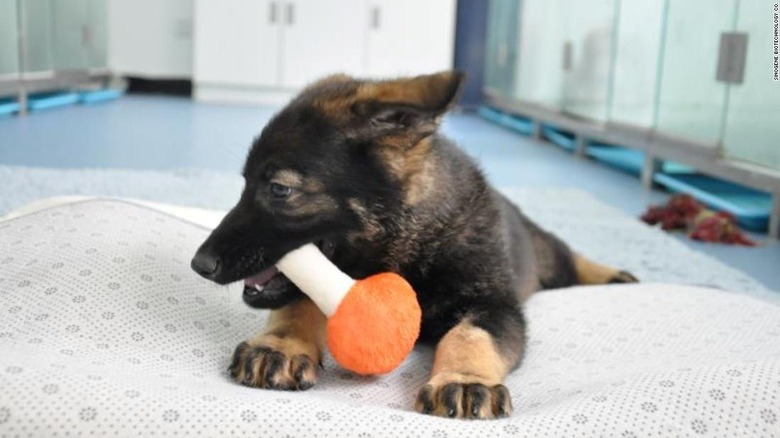China Cloned One Of Its Best Police Dogs, And She Just Entered Training
Cloning was once nothing more than a plot device for science fiction writers, but today it's being used in the real world in a variety of ways. Dozens of species of animal have been successfully cloned around the world for a variety of purposes, and China just used cloning technology to help bolster its police force.
As CNN reports, Chinese scientists have successfully cloned one of the country's most prized law-enforcement assets, a Kunming wolfdog named Huahuangma. The seven-year-old K-9 has proven invaluable to police efforts, helping to solve a dozen murder cases and aiding in many other criminal investigations. Now there's two of her.
Small skin samples from Huahuangma late last year, affording geneticists from China's Sinogene Biotechnology the opportunity to clone her using a technique that swaps parts of the dog's cell into a "blank" egg cell which was then implanted into a surrogate mother. Everything went to plan, and on December 19th Kunxun, the cloned puppy, was born.
China's Global Times reports that Kunxun's DNA is 99% identical to the cloned canine, and while she's only been in the training program for a few weeks she's already demonstrating her ability to live up to her lineage. Assuming she completes her training course, she will become a police dog when she reaches 10 months. of age.
Animal cloning technology has reached a point where it can be done with reasonable effectiveness by trained scientists who have the right tools at their disposal, but it still carries some heavy ethical concerns. The "playing God" aspect is something that cloning has yet to shake, and while there are pet cloning services available (for a high price), the very idea of duplicating a beloved animal still creeps a lot of people out.
In Kunxun's case, she was created because her predecessor was so good at her job. Normally, isolating positive traits in a breed is done through selective breeding, but cloning makes it possible to just copy animals directly. Will animals like Kunxun make cloning easier to stomach in the future? It's hard to say.
